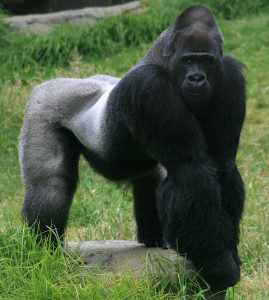It has been debated whether Asian or Western religions are more compatible with modern science. Perhaps the question itself is suggestive of the struggle for the survival of the fittest religion!
Some will argue that the Judeo-Christian faith was instrumental in the rise of modern science given such factors as its belief in a rational deity in whose image we are created and upon whose orderly and comprehensive designs we can reflect;[1] in fact, many of the leading early scientists like Pascal, Boyle and Kepler were devout Christians. Others will claim that Christianity is at odds with evolutionary theory, and that while Shintoism, for example, involves features like an animistic view of nature and disregard of universal principles that might have hindered scientific development in Japan, neither it nor Buddhism places humanity above nature as a fundamentally unique species.[2] Thus, it is argued that Shintoism, and with it Buddhism, is compatible with evolutionary theory. Even so, it was recently brought to my attention by a Japanese religious scholar in Japan that Darwinian thought was viewed as problematic in the royal court during the Meiji era given the Shinto claim promoted up to and during that time that the Emperors of Japan descended from the Sun Goddess Amaterasu; the view that all humans descended from other natural life forms, if widely circulated, would have dealt a most significant blow to Emperor worship at the time.
In passing, it is important to state that it is not my aim in this post to set apart my Christian faith over against other faith traditions as a fundamentally unique and separate species of religion that has no relation to them. Rather, it is my desire to consider how, regardless of one’s faith tradition, one might cultivate a profound sense of aesthetic wholeness beneficial to all of life. For what it is worth, many devout Christian believers past and present have found theistic evolution compatible with the Christian faith.[3] No doubt, they affirm that there is both continuity and discontinuity with creation as a whole. Here we come to a critical point in the discussion pertaining to evolutionary theory.
Darwinian evolution[4] teaches that humans developed from other, simpler life forms. In fact, all of life for Darwin has a common ancestry, possibly having emerged from some “warm little pond,” as he wrote in a letter to J.D. Hooker in 1871. Still, given that life has developed in increasingly complex ways over the ages, evolution does not put humans on the same level with gnats or apes. Regardless of what one believes about evolution as a theory, the theory does not equate humanity—or place it on the same level—with other life forms. For all the possible connections, the differences are more than nominal. Evolution does not stand still; rather, it proceeds generally toward greater complexity, advancing humanity beyond gnats and apes.[5]
One might argue that seeing greater complexity as an advance is a subjective value judgment. Perhaps that is the case, but if so, I take it to be likely a universal subjective value judgment (the act of ascribing value to natural processes would itself be a sign of human uniqueness in the evolutionary process). While Darwin may have been divided in his own subjective judgment of whether or not there is progress in evolution,[6] this should not come as too great a surprise. After all, progress does not always mean better—or better from every angle. For example, it is not always the smartest, or even the most virtuous people who win out according to evolution, but rather those who produce the most offspring that achieve adulthood and which also propagate.[7]
Given that evolution does not necessarily affirm virtue but productivity, it is important to promote consideration of virtue, which is distinct from Darwin’s evolutionary theory. While individuals like the great sociobiologist E. O. Wilson claims to promote evolutionary ethical models, Wilson can never move beyond emotivism involving (at best) predictions; in contrast, ethics, rightly conceived from my vantage point, deals not with predictions, but prescriptions.[8] Cultivation of an ethical model that makes ethical prescriptions promoting the well-being of all life forms, regardless of their complexity or productivity, is key.
It should not be merely a subjective or projected sense of equity and wholeness for which one contends, but one that is believed to be transcendent—beyond human projections and determinations. From many religious perspectives, life is given far more than gained, contrary to the Nietzschean superhuman doctrine that often lurks in our midst. Moreover, such traditions speak of the human responsibility to steward and care for our habitat and other life forms rather than ravage them at will.
With this point in mind, we return to the opening allusion to the planet of the apes. Whether or not we descended from the apes, or as the movie by that title suggests, there may be planets out there where apes are superior to humans, we have a moral responsibility to care for all occupants on our planet, including endangered apes like the late Harambe (and this regardless of how he fares in presidential polls[9]).
While it is important to consider carefully the topic of human origins, we should also be concerned about where we are going as a species in relation to other species. Recent articles over the Harambe tragedy raise important questions concerning wildlife, endangered species, and zoos.[10] Beyond important questions regarding whether or not Harambe should have been killed because of fears for the safety of the toddler who fell into the ape’s zoo enclosure, we should ask about the moral validity of zoos, circuses involving animals, and the like. Do animals exist ultimately for human entertainment and use, or do they have more than utilitarian value? I am firmly convinced that the latter is the case for theological and philosophical reasons bound up with the conviction that a given form of life is worth far more than whether or not humans find it useful or entertaining. After all, each of us as humans received life before we had earned any fraction of it. Moreover, we could not survive apart from our ecosystem involving other forms of life. We are not independent and set apart autonomously from other species on our planet, including apes; we share it with them, and must continue to do so.
What will such consideration of our solidarity with other forms of life on this planet entail? For those in the Judeo-Christian tradition, such solidarity entails stewardship: humanity is given the responsibility as the crown of creation to steward well the whole creation for God.[11] Such solidarity will entail important treatments of making sure zoos, if they continue to exist, focus on wildlife’s well-being, preservation and education, and work to eradicate entertainment that comes at the expense of ‘exotic’ animals. Such solidarity will also entail recycling cell phones, which can have a positive bearing on gorillas’ natural habitats.[12] Moreover, it will entail religious traditions across the globe focusing far more attention on the future of humanity as virtuous in relation to other species—and not being unduly preoccupied with human origins that seeks to promote our uniqueness as a species. If we do not give significant attention to these vitally important matters, but become calloused, we will do more to demonstrate humanity’s devolution as a species rather than its advance.
_______________
[1]On the import of the Judeo-Christian faith for the rise of modern science, see Michael Foster, “The Christian Doctrine of Creation and the Rise of Modern Natural Science,” Mind, vol. 43 (1934): 446–468; Eugene M. Klaaren, Religious Origins of Modern Science (Grand Rapids: Eerdmans Publishing Company, 1977); and Stanley L. Jaki, The Road of Science and the Ways to God (Chicago: University of Chicago Press, 1978).
[2]On Shintoism, for example, see the following article “Shinto” in the Encyclopedia of Science and Religion (2003) by Masakazu Hara. There Hara claims that Shinto’s animistic view of nature and “avoidance of establishing universal principles” may have hindered “the development of a modern scientific methodology or view of nature.” However, while historically Japan did not give rise to anything resembling modern science, and imported science and technology over the centuries, Shinto did not stand in the way of Japan becoming a leader in technology and science in the late twentieth century. Moreover, Shinto did not find Darwinian evolution problematic (apart from the point related to the Emperor’s descent noted above in this article) “because the human being has no special status as the crown of creation in Shinto or Buddhism. In Shinto the human being is simply a harmonious part of nature.”
[3]See the relevant footnotes pertaining to this point in my previous blog post titled “Planet of the Apes: Did Darwin Lead Us There?” Refer also to BioLogos.
[4] Here I should note that I am here using “evolutionary theory” descriptively for its popular “Ultra-Dariwnist” variation. On this term, see: Conor Cunningham, Darwin’s Pious Idea: Why the Ultra-Darwinists and Creationists Both Get It Wrong (Grand Rapids: William B. Eerdmans, 2010).
[5]See Cunningham, Darwin’s Pious Idea, pages 6-7.
[6]See Cunningham, Darwin’s Pious Idea, pages 138-139.
[7]This paragraph and the preceding one are excerpts from my prior post titled “Planet of the Apes: Did Darwin Lead Us There?”
[8]See my blog post titled “Should Ethics Be ‘Biologicized’? What Might that Mean for Eugenics?”
[9]See “Harambe the dead gorilla would fare well as independent presidential candidate, poll says.”
[10]See the following articles bearing on this subject: “Marc Bekoff, “Why Was Harambe the Gorilla in a Zoo in the First Place?” Scientific American, May 31, 2016; Karin Brulliard, “What Harambe’s Death Means for a Critically Endangered Species of Gorilla,” The Washington Post, June 2, 2016; and J. Weston Phippen, “Do We Need Zoos?” The Atlantic, June 2, 2016.
[11]See footnote 3 of my recent blog post titled “Are You Raging Against the Machine Age? Take a Forest Bath and Plant a Tree”. There I highlight key figures of the Christian past who emphasized the importance of caring for the creation rather than abusing it.
[12]Stefan Lovgren, “Can Cell-Phone Recycling Help African Gorillas?” National Geographic News, January 20, 2006.














